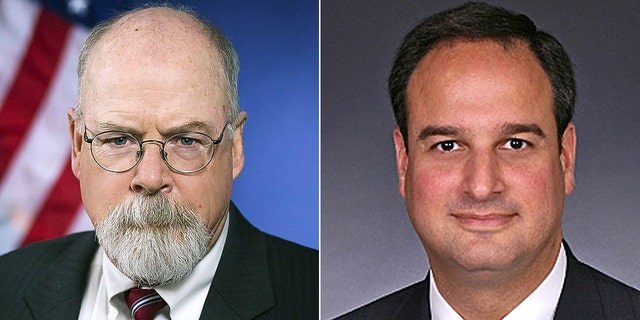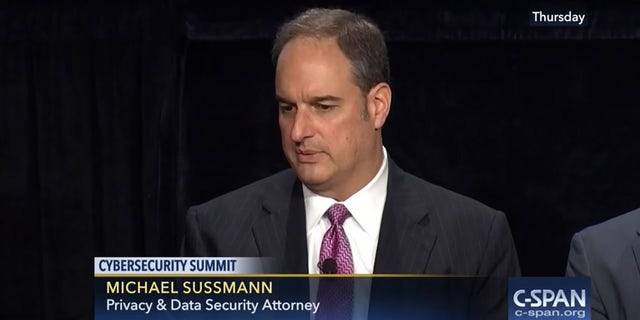More On: Giuliani
Rudy Giuliani was reportedly hit with ethics charges because of allegations of voter fraud
Truth about Trump's cyberassassins
Durham claims there is 'no basis' to remove the 'factual background' from the submission and rejects any desire to 'politicize' the Sussmann case
'I have it in my bedroom,' Giuliani teases, referring to evidence that Hillary Clinton's campaign spied on Trump
Modeling photos emerge of Mellissa Carone 'Mediterranean' as she prepares to be the star witness in in Hail Mary SCOTUS bid to topple Biden's victory
Sussmann's legal team had requested that the court strike Sussmann's background from filing.
Despite a move by Clinton campaign lawyer Michael Sussmann, Special Counsel John Durham ruled on Thursday that there is "no basis" to "strike" any aspect of his recent submission.
Durham denied that his office "consciously intended to politicize" the case, instead defending the "extra factual material" he offered, which he felt is "essential to showing" Sussmann's "alleged criminal behavior."
Sussmann's legal team submitted a petition on Tuesday asking the court to "strike" parts of Durham's Feb. 11 document, including the section under "Factual Background," saying that the sections would "taint" the jury pool.
Durham asked the court to "deny the defendant's request" in a fresh filing Thursday night.
"As an initial matter, defense counsel has presumed the Government’s bad faith and asserts the Special Counsel’s Office intentionally sought to politicize this case, inflame media coverage, and taint the jury pool," Durham’s filing states.
"That is simply not true," Durham states, noting that his Feb. 11 filing "included two paragraphs of limited additional factual detail in its Motion for valid and straightforward reasons."

"First, those paragraphs reflect conduct that is intertwined with, and part of, events that are central to proving the defendant’s alleged criminal conduct," Durham wrote.
"Second, the Government included these paragraphs to apprise the Court of the factual basis for one of the potential conflicts described in the Government’s Motion, namely, that a member of the defense team was working for the Executive Office of the President of the United States ("EOP") during relevant events that involved the EOP," Durham wrote.
Durham added: "If third parties or members of the media have overstated, understated, or otherwise misinterpreted facts contained in the Government’s Motion, that does not in any way undermine the valid reasons for the Government’s inclusion of this information."
"In light of the above, there is no basis to strike any portion of the Government’s Motion," Durham wrote, adding that the government intends to file motions in which it will "further discuss these and other pertinent facts to explain why they constitute relevant and admissible evidence at trial."
Durham, in the Feb. 11 filing, which was focused on identifying a conflict of interest regarding a lawyer for Sussmann, revealed that his office had learned that a member of Sussmann’s defense "previously worked as Special Counsel to the then-FBI Director from 2013 to 2014."
"In connection with that work, Defense Team Member-1 developed professional and/or personal relationships with several individuals who later were involved with and/or knowledgeable of the FBI’s investigation of the Russian Bank-1 allegations," Durham wrote in the Feb. 11 filing, adding that following his employment at the FBI, Defense Team Member-1 worked from "2014 to early 2017 as an attorney in the EOP which, as noted above, was involved in certain factual issues that the Government expects will be relevant at trial and any sentencing proceedings."
Sussmann has been charged with giving a false statement as part of Durham's investigation into the Trump-Russia inquiry. Sussmann has entered a not-guilty plea.
Sussmann allegedly told then-FBI General Counsel James Baker in September 2016, less than two months before the 2016 presidential election, that he was not working "for any client" when he requested and held a meeting in which he presented "purported data and 'white papers' that allegedly demonstrated a covert communications channel" between the Trump Organization and Alfa Bank, which has ties to the Kremlin.
Durham alleged in a filing on Feb. 11 under the "Factual Background" section that Sussmann and his legal team have asked the Court to "strike," that Sussmann provided two U.S. government agencies with information from a tech executive that attempted to link Donald Trump, who was a presidential candidate at the time, to Russia-based Alfa Bank.
Rodney Joffe has subsequently been revealed as the tech executive. Joffe's name is not included in Durham's petition, and he has not been charged with any wrongdoing.
Durham claimed in that section of his filing that Sussmann, Joffe, and Joffe's associates "exploited" internet traffic pertaining to a "specific healthcare provider," Trump Tower, Trump's Central Park West apartment building, and the Executive Office of the President of the United States in order to "establish 'an inference' and 'narrative,'" which he then brought to federal government agencies tying Trump to Russia.
Durham said in the lawsuit that Sussmann's "billing records show" that he "repeatedly billed the Clinton Campaign for his services" on the Alfa Bank claims.
Sussmann's legal team said earlier this week that Durham had "done more than merely submit a paper noting possible conflicts of interest."
"Rather, the Special Counsel has filed another filing in this matter that contains prejudicial—and false—allegations that are extraneous to his Motion and to the alleged crime, and are clearly meant to politicize this case, inflame media attention, and taint the jury pool," Sussmann's attorneys stated.
Sussmann's legal team also filed a request to dismiss the lawsuit against him on Thursday. Durham's petition Thursday night was in response to the original move earlier in the week to "strike" the "factual background" from his file, not the motion to dismiss the lawsuit against Sussmann.
According to the "factual background" portion of Durham's petition, Sussmann and the tech executive met and talked with another law partner who was working as general counsel for the Clinton campaign. According to Fox News, the lawyer is Marc Elias, who formerly worked at the legal firm Perkins Coie.
According to Durham, Joffe's internet firm "came to access and maintain dedicated servers" for the Executive Office of the President as "part of a sensitive arrangement wherein it offered DNS resolution services to the EOP."
Durham claims that "Tech Executive-1 and his friends took advantage of this agreement by mining the EOP's DNS traffic and other data to acquire negative information on Donald Trump."
On Tuesday, Joffe, a representative for Tech Executive-1, defended his work.
"When respected cyber-security researchers discovered DNS queries from Russian-made Yota phones in close proximity to the Trump campaign and the EOP, they were deeply concerned about the anomalies they discovered in the data and prepared a report of their findings, which was subsequently shared with the CIA," Joffe's spokesperson said.
Durham claims he "provided data which he claimed reflected purportedly suspicious DNS lookups by these entities of internet protocol (IP) addresses affiliated with a Russian mobile phone provider" during Sussmann's meeting with the second US government agency, and that the lookups "demonstrated Trump and/or his associates were using supposedly rare, Russian-made wireless phones in the vicinity of the White House and other locations."
"The Special Counsel's Office has found no evidence to substantiate these assertions," Durham said, adding that the "lookups were far from uncommon in the United States."
"For example, the more complete data that Tech Executive-1 and his associates gathered—but did not provide to Agency 2--showed that between approximately 2014 and 2017, there were over 3 million lookups of Russian Phone-Prover 1 IP addresses that originated with U.S.-based IP addresses," Durham wrote. "Less than 1,000 of these lookups were initiated by IP addresses associated with Trump Tower."
Durham went on to say that data gathered by Joffe revealed that lookups started as early as 2014, under the Obama administration and years before Trump entered office, which he called "another truth which the charges overlooked."
"In his meeting with Agency-2 employees, the defendant also made a substantially similar false statement as he made to the FBI General Counsel," Durham wrote. "In particular, the defendant asserted that he was not representing a particular client in conveying the above allegations."
"In truth and in fact, the defendant was representing Tech Executive-1--a fact the defendant subsequently acknowledged under oath in December 2017 testimony before Congress, without identifying the client by name," Durham wrote.
A spokesperson for the CIA did not immediately respond to Fox News' request for comment.

Meanwhile, in Sussmann's Thursday motion to have the case dismissed altogether, his legal team claimed a case of "extraordinary prosecutorial overreach."
Sussmann’s legal team insisted that he "did not make any false statement to the FBI." The attorney added that the false statement alleged in the indictment is "about an entirely ancillary matter," and "immaterial as a matter of law."
"It has long been a crime to make a false statement to the government. But the law criminalizes only false statements that are material—false statements that matter because they can actually affect a specific decision of the government," the lawyers wrote, adding that, by contrast, false statements "about ancillary matters" are "immaterial and cannot give rise to criminal liability."
"Accordingly, where individuals have been prosecuted for providing tips to government investigators, they have historically been charged with making a false statement only where the tip itself was alleged to be false, because that is the only statement that could affect the specific decision to commence an investigation," the lawyers wrote. "Indeed, the defense is aware of no case in which an individual has provided a tip to the government and has been charged with making any false statement other than providing a false tip. But that is exactly what has happened here."
The lawyers argued that Sussmann "voluntarily" met with the FBI in the fall of 2016 to "pass along information that raised national security concerns."
"He met with the FBI, in other words, to provide a tip," Sussmann’s lawyers wrote. "There is no allegation in the indictment that the tip he provided was false. And there is no allegation that he believed the tip he provided was false. Rather, Mr. Sussmann has been charged with making a false statement about an entirely ancillary matter—about who his client may have been when he met with the FBI—which is a fact that even the Special Counsel’s own Indictment fails to allege had any effect on the FBI’s decision to open an investigation."
"Allowing this case to go forward would risk criminalizing ordinary conduct, raise First Amendment concerns, dissuade honest citizens from coming forward with tips, and chill the advocacy of lawyers who interact with the government," his lawyers argued.
"The Special Counsel’s unprecedented and unlawful overreach should not be countenanced, and the single count against Mr. Sussmann should be dismissed," they added.
Neither Durham, nor the court, has responded to Sussmann's motion to dismiss the case.






















